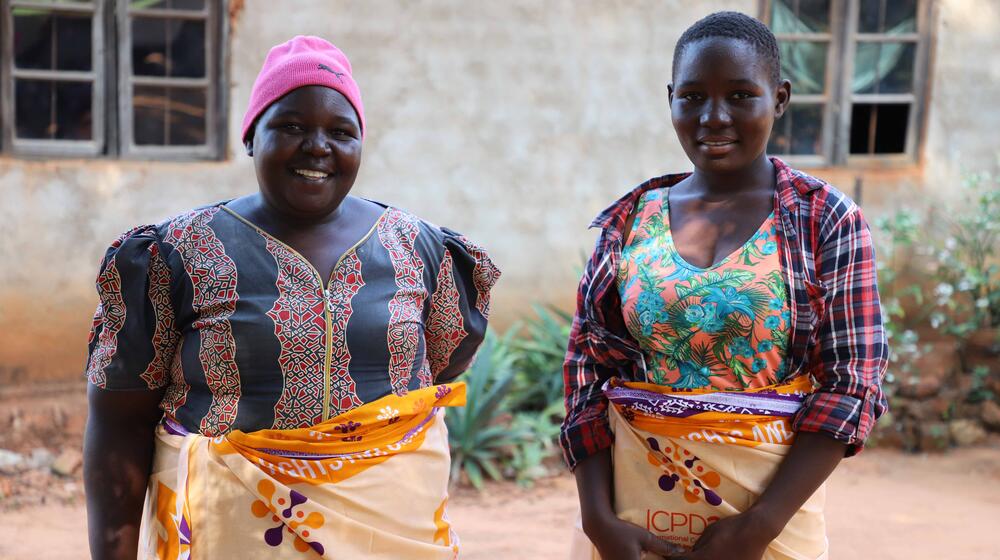News
Against the odds, Malawian girl overcomes child marriage, agonizing labour and obstetric fistula
- 11 September 2023
News
NKHATA BAY, Malawi – Jacqueline was just 15 when she fell in love with a boy from another village. The two eloped, initiating a customary marriage rather than a formal one. But Jacqueline kept the relationship a secret from her mother, Margaret Kumwenda, who grew worried about her daughter’s increasing distraction and frequent disappearances.
When Ms. Kumwenda learned about the elopement, she was upset, even asking the police to take action against the boy. “They told me that he was still a minor, and all they could do was counsel him and Jacqueline,” she recently recalled to UNFPA, the UN sexual and reproductive health agency.
The counselling seemed to work for a time. Jacqueline, who had always been a hardworking student, applied a renewed dedication to her studies. Ms. Kumwenda hoped her daughter would finish her education before getting serious about her relationship.
But dropout rates are high for girls in Jacqueline’s remote community, which is an hour’s walk from the nearest school. Early marriage is often seen as inevitable for teenage girls, who commonly receive little information – if any – about their sexual and reproductive health and rights.
With no hope for a different future, Jacqueline, too, decided to leave school. One day, she packed up her belongings and ran away with her husband, moving to Mzimba District.
“We tried looking for her, but to no avail,” Ms. Kumwenda said.
Childbirth injury and abandonment
Jacqueline soon became pregnant and, at age 16, went into labour at a local health facility. The delivery was obstructed, prolonged and agonizing, resulting in an obstetric fistula – a traumatic childbirth injury in which a hole is torn in the birth canal. Adolescent girls, in particular, are vulnerable to obstructed labour and obstetric fistula.
Eventually Jacqueline delivered a baby girl. The baby thrived in the days following the birth, but Jacqueline did not. Like most fistula survivors, she began to leak faeces and urine, and her injuries failed to heal.
“My life was lonely as I couldn’t go out of the house because I was wetting myself,” Jacqueline later recounted to UNFPA. For months she was isolated, confined indoors by her injuries.
Then one day, her husband decided to send her away. Tragically, abandonment by a spouse or family is common among fistula survivors. Afraid of contacting Ms. Kumwenda directly, the boy sent an anonymous message through an intermediary: Your daughter is unwell and wants to come home.

Human rights at stake
The reunion was bittersweet for Ms. Kumwenda. She was relieved to have her daughter home, and overjoyed to meet her baby granddaughter. At the same time, her daughter’s condition devastated her.
“I didn’t know what to do,” said Ms. Kumwenda.
An untreated fistula can cause serious physical ailments – not only chronic incontinence but also frequent infections and possible infertility. But obstetric fistula is not simply a health issue. It is a human rights issue.
In most of the world, obstetric fistula is preventable with access to emergency obstetric care – usually a Caesarean section. Today, this condition overwhelming affects the most vulnerable women and girls: those with limited access to the comprehensive sexuality education that would enable them to prevent an adolescent pregnancy, those who experience child marriage, and those without access to a skilled birth attendant and competent emergency care during delivery.
The consequences of fistula only compound the hardships these women and girls face. They experience stigma, discrimination from communities, families and employers, and often lasting psychological harm.
A new path
But Ms. Kumwenda refused to give up. “I remembered that there was a woman in our community who always talked about a similar condition, and how she can help to get it treated,” she recalled.
The woman was a fistula ambassador for the Spotlight Initiative, a gender equality programme funded by the European Union and implemented by UNFPA and other United Nations agencies. “She agreed to come to our house the next day,” Ms. Kumwenda said.
Soon, Jacqueline was referred to the Nkhata Bay District Hospital, and from there she was scheduled for surgery at the district health office, supported by the Spotlight Initiative.
“I don’t know what could have happened if I didn’t come here,” she said at the hospital, after the repair surgery.
UNFPA and Spotlight are also working with the local community to address the root causes of obstetric fistula: the vulnerabilities of women and girls. Together with the Nkhata Bay District Council, they are empowering women and girls with knowledge about sexual and reproductive health and rights.
As for Jacqueline, she is now healed and able to think about her future – and that of her two-year-old daughter – and she has some powerful new role models. “I thank those who helped me get well again,” she said.